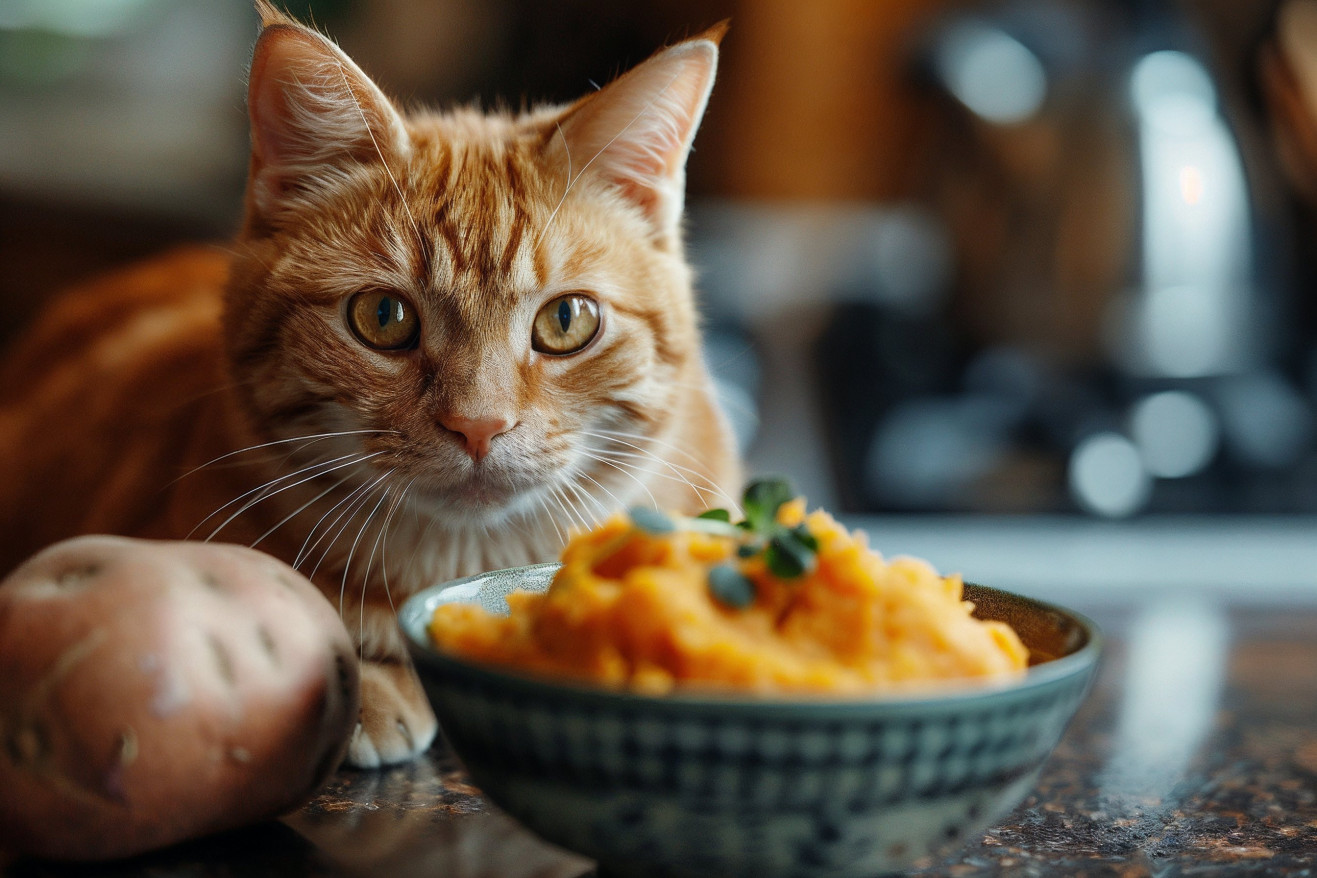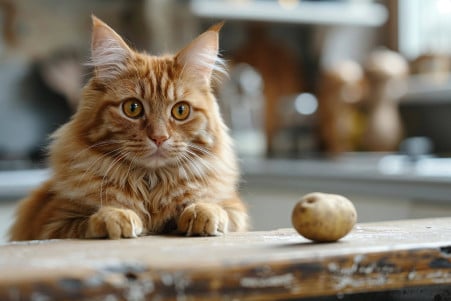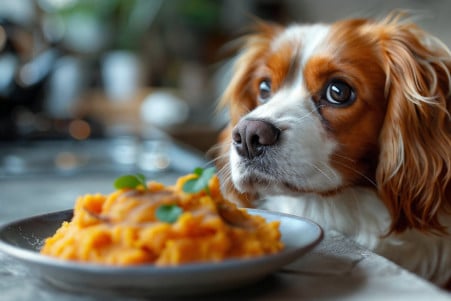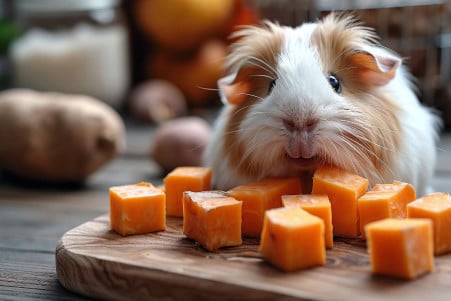Can Cats Eat Sweet Potatoes? Benefits and Risks Explained
31 March 2024 • Updated 30 March 2024

Sweet potatoes can offer a range of nutrients and even some health benefits, so they can be a good choice for your cat's diet. However, there are also some things to watch out for. Cats can eat sweet potatoes in small amounts, as an occasional treat. They are safe and can provide important fiber, vitamins, and minerals that can help your cat stay healthy. That said, sweet potatoes are high in carbohydrates, so they should not be a staple of your cat's diet, which should be based on protein.
In this evidence-based article, we'll look at veterinary nutritional research and behavioral science to help you understand the potential benefits and drawbacks of feeding your cat sweet potatoes. You'll learn about how cats' bodies handle carbs, how much and how to feed your cat sweet potatoes, and what to keep in mind about your cat's specific dietary needs and likes and dislikes.
Can cats eat sweet potatoes?
Nutritional Benefits of Sweet Potatoes for Cats
There are several nutritional benefits of sweet potatoes that can help cats if they are included in their diet in the right way. One of the most important is their fiber content, which can help with digestion and prevent constipation by ensuring that cats have regular bowel movements, according to BeChewy. Both soluble and insoluble fiber in sweet potatoes can help ensure that the digestive system is working properly.
Sweet potatoes are also a great source of important vitamins, including vitamin A, vitamin C, and vitamin B6, as reported by LoveNala. Vitamin A is important for vision, skin, and coat health, while vitamin C is an antioxidant that can help boost the immune system. Vitamin B6 is important for protein metabolism and the production of neurotransmitters.
Sweet potatoes are also high in beta-carotene, which is responsible for their bright orange color and is also an antioxidant. According to HealthyPawsPetInsurance, antioxidants can help protect the body from free radicals that can damage cells and lead to chronic conditions. By providing this kind of protection, sweet potatoes can help support a cat's overall health.
In addition, sweet potatoes are low in fat and calories compared to many other ingredients used in commercial cat food. This means that they are low in calories, and this low calorie density can make them a good option for cats that need to lose weight. They can eat a larger portion of sweet potatoes without consuming too many calories and gaining weight. Because of this mix of fiber, vitamins, and antioxidants, sweet potatoes can be a healthy addition to a cat's diet. That said, it's important to remember that cats are obligate carnivores and should not eat a diet that is high in plant-based foods.
Moderation and Portion Control
Although sweet potatoes can be good for cats, it's important to practice portion control. BeChewy suggests that cats be limited to 1-2 tablespoons of cooked sweet potato per day. This should be no more than 10% of their daily food intake, especially since cats have a limited ability to metabolize carbohydrates, which are found in sweet potatoes.
Feeding cats too much sweet potato can cause digestive problems like diarrhea and gas, as well as weight gain and potential nutrient imbalances, notes The Wildest. To introduce sweet potatoes to your cat, feed them small amounts and observe how they respond. Look for signs of digestive upset, including vomiting, loss of appetite, and changes in stool.
It's important to think of sweet potatoes as a supplement to your cat's diet, not a replacement for their regular food. As WagWalking explains, it's important to practice portion control, and sweet potatoes should only make up 5-10% of a cat's daily calories. Make sure your cat's diet is well-balanced and rich in protein, and use sweet potatoes in moderation to avoid potential health problems.
How to Prepare and Serve Sweet Potatoes
Sweet potatoes need to be cooked before being given to cats, as raw potatoes can be hard for them to digest. Per Cats.com, cats can eat small amounts of cooked sweet potatoes, including steamed, mashed, or baked sweet potatoes. However, it's important to avoid any seasonings, oils, or other additives, which can be harmful or even poisonous to cats.
The skin and leaves of sweet potatoes are not safe for cats to eat and can cause digestive problems. Per ManyPets, it's best to peel the sweet potatoes and remove any roots or parts of the potato that look discolored before cooking them, as these parts can contain solanine, a substance that may be poisonous to cats.
When preparing sweet potatoes for your cat, the best ways to cook them are baking or steaming, which will help retain the nutrients without adding unhealthy fats or seasonings. Purina recommends cutting the cooked sweet potato into small pieces to make it easier for your cat to eat.
It's important to watch your cat for any signs of a reaction when you first introduce sweet potatoes, as some cats may be allergic or sensitive to them. If your cat experiences digestive issues like vomiting or diarrhea, it may be a sign that they're sensitive to sweet potatoes and you should stop giving them to your pet.
Sweet Potato-Based Products and Snacks
Although sweet potatoes can be a healthy treat for cats, pet parents should be careful about the sweet potato-based products they buy. Per DailyPaws, cooked potatoes are safe for cats to eat as a snack, but they should not exceed 10% of a cat's diet because they do not provide complete and balanced nutrition.
While many commercial cat treats and foods that include sweet potato can be a good option, pet parents should be sure to read labels to make sure they're getting a high-quality product. Waggle explains that sweet potato fries, chips, and other fried or processed sweet potato products are not good for cats because they're high in fat and sodium, which can lead to digestive issues and weight gain.
Likewise, Hepper notes that while some baby food formulas are safe for cats to eat as an occasional treat, pet parents should avoid those that contain added sugars, onions, garlic, or other ingredients that are toxic to cats. While homemade sweet potato snacks can be a healthier option, pet parents should make sure they're using recipes that are safe for cats and that don't contain too many carbs.
In general, when buying sweet potato-based products for cats, pet parents should look for products that are high-quality and minimally processed and that don't contain any unhealthy additives. By working with a vet and paying attention to their cat's response, pet parents can make sure they're feeding sweet potatoes to their cat in a way that's safe and healthy.
Conclusion: Can Cats Eat Sweet Potatoes?
Sweet potatoes can be a safe and even helpful addition to a cat's diet, but they should be used in moderation. Although sweet potatoes offer fiber, vitamins, and antioxidants that can help with your cat's overall health, cats are obligate carnivores and don't need a lot of nutrients from plants.
Cooked sweet potatoes can be given to cats in small amounts, with 1-2 tablespoons per day being the maximum amount and no more than 10% of their diet. Overconsumption of sweet potatoes can lead to gastrointestinal upset, weight gain, and even nutrient deficiencies. In addition, sweet potato skins and leaves should be avoided because they can cause digestive issues.
When adding sweet potatoes to your cat's diet, it's important to make sure they are cooked thoroughly and not seasoned with anything that could be toxic to cats, such as garlic or onion. While cat treats or cat food that contains sweet potatoes can be a good option, it's important to read the labels carefully to make sure they are safe and healthy for your cat.
In the end, sweet potatoes should be considered a treat, not a meal. Cats need a balanced diet that is high in protein, and sweet potatoes can be a good way to add extra nutrients to their diet if they are used in moderation. It's always best to consult with a veterinarian to determine the best way to meet your cat's individual dietary needs and health.


